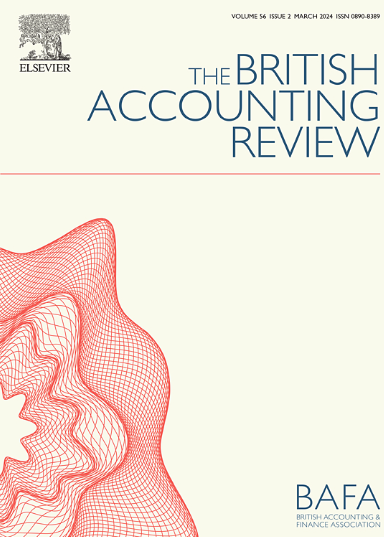当以财务为导向的绩效衡量系统支持混合集体意义构建时:以合作银行为例
IF 5.5
3区 管理学
Q1 BUSINESS, FINANCE
引用次数: 0
摘要
绩效衡量系统(PMS)的支持理念是:绩效衡量是组织绩效的驱动力。在这一假设下,学者们讨论并尝试开发包括财务和非财务测量在内的综合绩效管理系统。本文以一个混合型组织的具体情况和案例研究结果为基础,探讨了在混合型环境中,不完整的、以财务为导向的绩效管理系统如何能够支持集体意识的形成。研究结果表明,一家合作银行的管理人员是如何将 PMS 作为一种人工制品来使用的,从而支持对话和物质实践。与该组织强大的社会化进程以及管理人员和员工捍卫其社会和合作身份的需要相结合,项目管理系统支持了银行的混合性质,并避免了紧张和冲突。这表明,项目管理系统具有一个特殊的特点:管理人员和员工在处理和使用该系统时具有灵活性。因此,本文表明,即使是不完整的项目管理系统也能使混合型组织避免与其混合价值观有关的紧张和冲突,从而为文献中关于对混合型组织中的项目管理系统进行更多研究的呼吁做出了贡献。本文章由计算机程序翻译,如有差异,请以英文原文为准。
When a financially oriented performance measurement system supports hybrid collective sensemaking: The case of a cooperative bank
A performance measurement system (PMS) is supported by the idea that performance measurements are drivers of organisational performance. Under that assumption, scholars have discussed and tried to develop comprehensive PMSs that include both financial and non-financial measurements. Building on the specific context of a hybrid organisation and findings from a case study, this paper explores how an incomplete and financially oriented PMS in a hybrid setting can nevertheless support collective sensemaking. The findings show how a PMS is used by managers at a cooperative bank as an artefact, supporting conversational and material practices. Combined with the organisation's strong socialisation process and managers and employees' need to defend their social and cooperative identity, a PMS supports the bank's hybrid nature and leads to the avoidance of tension and conflict. That shows that the PMS presents a specific feature: flexibility in its handling and use by managers and employees. This paper thus contributes to the call made in the literature for more studies on PMSs in hybrid organisations by showing that even an incomplete PMS can allow such organisations to avoid tension and conflict relating to their hybrid values.
求助全文
通过发布文献求助,成功后即可免费获取论文全文。
去求助
来源期刊

British Accounting Review
BUSINESS, FINANCE-
CiteScore
8.60
自引率
3.90%
发文量
39
审稿时长
76 days
期刊介绍:
The British Accounting Review*is pleased to publish original scholarly papers across the whole spectrum of accounting and finance. The journal is eclectic and pluralistic and contributions are welcomed across a wide range of research methodologies (e.g. analytical, archival, experimental, survey and qualitative case methods) and topics (e.g. financial accounting, management accounting, finance and financial management, auditing, public sector accounting, social and environmental accounting; accounting education and accounting history), evidence from UK and non-UK sources are equally acceptable.
 求助内容:
求助内容: 应助结果提醒方式:
应助结果提醒方式:


